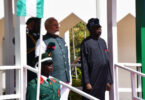The misrepresentation of the good intention of telecom operators to secure a slight adjustment on end-user tariff on voice calls and data services has led to the carriers slowing down on the push, it was learnt.... CLICK TO READ THE FULL NEWS HERE▶▶
The operators, acting under the aegis of Association of Licensed Telecom Operators of Nigeria (ALTON), had sought the imprimatur of the Federal Government, via the Nigerian Communications Commission (NCC), to adjust call and data tariff to reflect cost of operation in the country.
The NCC had refused to accede to their demand, a decision insiders said was based on political expediency. In a pushback, the telcos had said their services should not be used as palliative to cushion the impact of ongoing economic hardships in the country.
A source at the weekend, however, said the operators decided to slow down on the push because it was being misunderstood as a push designed to incite members of the public against the government.

“Well, as you can see, we have temporarily suspended our push for adjustment for tariff hike because some elements within were sort of reading political meaning to it and we are business people; we are not politicians. All we are calling for is a sustainable tariff that will make us remain in business. The way things are going now, we may go back to the era of NITEL. I hope no Nigerian would want that to happen,” the source said.
Two subscriber bodies, the National Association of Telecom Subscribers of Nigeria (NATCOM) and Association of Telephone, CableTv, and Internet Subscribers of Nigeria (ATCIS-Nigeria) have differed on the MNOs’ request.
While Deolu Ogunbanjo of NATCOM said a slight increase that would not asphyxiate the subscribers would be a good thing considering that, for over a decade, tariff has not gone up, ATCIS-Nigeria leader Sina Bilesanmi said the operators should first ensure quality service delivery and proper engagement with stakeholders before talking about any hike at all.
“Considering that the current tariff has been existence for over a decade, a slight increase is not a bad idea. Service providers in other sectors have increased costs,” Ogunbanjo said.
Bilesanmi said he sympathized with the operators over the plight but demanded more.
“While we acknowledge the unease in the operating environment, we urge the operators to improve service quality; deepen stakeholders’ engagement to achieve win-win situation for all,” he said.
About two years ago, the telcos had proposed a 40 per cent increase call cost per minute, SMS, and data to the NCC as a result of the rising cost of running a business in the country.
Based on their proposal then, the price floor of calls would have increased from N6.4 to N8.95 while the price cap of SMS will increase from N4 to N5.61, according to a letter then entitled: ‘Impact of the Economic and Security Issues on the Telecommunications Sector’ addressed to the NCC by ALTON.
The operators had argued that there had been a 40 per cent increase in the cost of doing business in the country with huge financial impact following the nation’s economic recession in 2020 and the effect of the ongoing Ukraine/Russia crisis which had resulted in an increase in energy costs, increasing opex by 35 per cent.
The letter had read in part, “As the commission may be aware, the power sector under the supervision of its Nigerian Electricity Regulatory Commission of the power sector in November 2020 undertook a review of electricity tariffs to cater for the economic headwinds reported above.
“In view of the foregoing, ALTON considers it expedient for the telecommunications sector to undergo periodic cost adjustments through the commission’s intervention in order to minimise the impact of the challenging economic issues faced by our members.
Details are hereunder: “Upward review of the price determination for voice and data and SMS. Given the state of the economy and the circa 40 per cent increase in the cost of doing business, we wish to request for an interim administrative review of the mobile (voice) termination rate for voice; administrative data floor price, and cost of SMS as reflected in extant instruments.
“With respect to voice an SMS cost, ALTON respectfully requests the commission to consider a mark-up approach to address the upward price adjustment desirable for the industry. We have enclosed herein and marked as ‘Annexure 1’our proposal in that regard.
“For data services, we wish to request that the commission implements the recommendations in the August 2020 KPMG report on the determination of cost-based pricing for wholesale and retail broadband service in Nigeria. Excerpts from the report, are attached and marked ‘Annexure 2’ to provide a further illustration.
“In implementing the said recommendations, however, we recommend that the 40 per cent increase in the cost of doing business be factored in to arrive at a cost price per GB in view of the current economic situation.”
ALTON added that to further help telcos during this economic crisis, NCC should provide other means of penalising operators rather than punitive monetary sanctions; extend the payment timeline of relevant regulatory levies and fees; prevail on the Federal Government to sign the executive order declaring telecoms infrastructure as a critical national infrastructure to mitigate cost spent replacing damaged and stolen infrastructures, among other things.
In the annexure of one section of the letter, the body requested an upward adjustment of the MTR by 40 per cent.
It said, “For large operators, the new interim MTR of N5.46 from N3.90 reflecting 40 per cent increase in the cost of business.
“For small operators, new interim MTR of N6.58 from N4.70 reflecting 40 per cent increase in the cost of business.”
And not too long ago, the MNOs had renewed push to hike the end user tariff of telecom services in the country citing high cost of doing business.
They had also urged President Bola Tinubu to outrightly cancel the recently suspended 7.5per cent value added tax (VAT) imposed on automotive gas oil (AGO) which is the major fuel for powering the telecom sector in the absence of reliable energy from the national grid.
ALTON in a submission to the House Committee on Communication in Abuja, said while other sectors of the economy have increased charges, the telecom sector had not.
ALTON Chairman, Gbenga Adebayo said the cost of doing business in the country has risen sharply in the preceding months due to a myriad of factors generally impacting businesses including macroeconomic headwinds such as inflation, currency devaluation; sustained difficulty in accessing foreign exchange (forex) at an affordable rate; rising energy costs; the rising cost of securing telecommunications facilities and field personnel in the face of worsening insecurity and many others.
“Notwithstanding the foregoing, the pricing regulatory framework has not been reviewed to account for changes in macroeconomic conditions and reflect current cost profile of operators.
“As such, ALTON’s members are unable to price services at a sustainable rate.
“Consumer prices in other sectors have seen a steep rise over the last six years as they adjust to reflect macro-economic realities. However, telco prices have remained flat and even declined. Contrary to the price trends in other sectors, telcos have had to adjust for the macroeconomic headwinds by an increasing erosion of margins; other highly regulated sectors such as power and insurance have implemented price increases over the last year.
“Insurance prices have risen 200per cent with power raising prices by over 40per cent. Telecommunications is the only sector that has not experienced a pricing regulatory framework review raising prices notwithstanding local and global macroeconomic realities,” he said.
According to Adebayo, not only has this impaired investor confidence and depleted available investible funds necessary to optimize infrastructure for improved service delivery, it also threatens the very sustainability of the sector’s operations.
He urged the Committee to drive collaborative partnership with key stakeholders such as the Office of National Security Adviser (ONSA) to secure executive and legislative action on the declaration of telecoms infrastructure as Critical National Infrastructure (CNI) and criminalization of malicious site sealing, access denials, and willful/negligent destruction of telecommunications infrastructure.
This, he argued, could be done either by an Executive Order or relevant amendment of the Cybercrimes Act. He recalled that an attempt was made by the immediate past National Security Adviser (NSA) to secure Presidential approval for an Executive Order (EO), and requested the Committee to ‘respectfully liaise with the current NSA to bring to fruition the EO on CNI’.
He also sought sensitization & advocacy for state governments’ adoption of the harmonized RoW charge of N145/Linear Meter approved by the National Economic Council in 2019; collaborate with the Presidential Committee on Fiscal Policy and Tax Reforms to definitively address the perennial incidence of multiple taxation in the Nigerian telecommunications sector including the elimination of the currently suspended excise duty on telecoms services.
Speaking to the punitive diesel cost and its impact on operations cost, he said ALTON is pleased and commends the recent Federal Government’s announcement of the suspension of the 7.5per cent VAT on diesel price for the next six months.
“This is a welcome development coming from the fact that in August 2023, we were paying, on average, N854.32 per liter, compared to the lower cost of N786.88 per liter recorded in the same month of the previous year. The 7.5per cent VAT on diesel has pushed pump prices to N900 at least and N950 at the maximum across Nigeria as at today.
“The impact of this increase is dire for telecommunications operations, particularly for our members in the colocation segment. The 300per cent increase in diesel cost which was implemented at the beginning of the year, humongous indebtedness in the industry, lack of access to and increased rate of foreign exchange to service their operations, dire levels of insecurity across the country with increased theft and damage to our members sites, have all prevented our members from running their business efficiently and profitably.
“This new challenge of the introduction of the 7.5per cent VAT will not only further impact our members operating capital, but it will also erode their profit margins, discourage investments, stifle growth, result in loss of employment and ultimately dovetail in a progressively reduced GDP,” Adebayo told the lawmakers.
While commending President Tinubu for granting the six month grace, he said it will be better to make it permanent by directing an indefinite suspension of the 7.5per cent VAT beyond the six months already granted.
“The impact on the industry and the economy will be positively felt by all,” he said.
He also highlighted the refusal of the Federal Capital Development Authority (FCDA) to Grant Build Permit for Infrastructure roll-out as a major concern of the industry.
“The provision of telecoms service in the Federal Capital Territory (FCT) Abuja has been hampered by the refusal of the Federal Capital Development Authority (FCDA) and Abuja Metropolitan Management Council (AMMC), to grant permits to our members to build sites.
Despite concerted engagement, FCDA has maintained that due to the need to maintain the Abuja Master Plan, it will not grant approval to our members to build new sites in the Federal Capital Territory, Abuja. Telecoms services depend on terrestrial infrastructure and without these infrastructure in place, the quality of services cannot be guaranteed.
In view of the huge investment towards deployment of telecoms infrastructure in the FCT, our members are indeed concerned about this development, given its significant impact on their ability to meet regulatory obligations and consumer expectations in the FCT. Given its position as the seat of government and host to several key functionalities of Government, with an ever-increasing population, our members have been unable to match infrastructure deployment with the growth patterns and on-ground requirements of the FCT.
This is evidenced by unsatisfactory service reception within locations in the FCT, resulting in dropped calls and complaints of unsatisfactory service experience the Telecommunication infrastructure Service Providers (TSPs) as well as Mobile Network Operators (MNOs) have been putting in concerted efforts to bridge the gaps in Quality of Service (QoS).
“Despite concerted efforts of our members to address the coverage requirement gaps through optimization and other short-term measures, these coverage gaps exist of the view that FCDA and AMMC’s current position will not in the long-term enable us to provide the desired Quality of Service (QoS) levels in the FCT.
“While we understand that AMMC may have justifiable basis for its decision to put the granting of permits and approvals on hold as stated in its circular, we also believe that there should be a possibility of working out a solution that will enable our deployment of required telecommunication infrastructure within the FCT- without prejudice to the masterplan,” he said.
He said ALTON respectfully states that without adequate infrastructure deployment, the provision of required levels of telecommunications services within the FCT cannot be guaranteed. We therefore respectfully invite you to use your good office to liaise with the FCDA to agree & authorize suitable locations for new site built by our members.
“The House Committee on Communications should as a matter of urgency intervene so that permits can be issued to our members to deploy infrastructure to cater for the communication needs of the FCT and its environs.”











